Institutional Context
Summary
The University of Exeter is research-intensive Russell Group University, 94% of our research has internationally excellent impact, and 60% has world-leading impact. Located on four campuses across Devon and Cornwall, we have highly rated teaching programmes and a vibrant community of 30,000 students (21/22).
We provide R&D, skills and growth solutions with a total value of £103.4M (21/220) for organisations from start-ups and SMEs, to multi-nationals, NGOs and government. Each year we work with partners on over 2,000 projects of various sizes across key sectors, linked to our expertise.
Our business acceleration services are delivered through SETsquared, the World’s number 1 University Business incubator. We have 29 active academic–led spin-outs and an active entrepreneurship ecosystem for staff and students.
Institutional context
Our ambition is to become global 100 research leader at the heart of a thriving regional innovation ecosystem. 60% of our research has world-leading impact (REF2021) and more than 500 academics work with business partners on over 2,000 projects, valued at more than £103.4M (21/22).
Our Strategy 2030 sets out clear ambitions, and drives our Knowledge Exchange priorities. Our vision is to drive sustainable, healthy, and socially just futures by building effective, dynamic partnerships for innovation and impact leading to social and economic benefit.
We partner with the public and private sectors in areas such as environment, water, agritech, govtech, legal, education, renewable energy, advanced engineering, data and AI, dementia, heritage, creative industries, and healthy living.
Our priority is to deliver transformational partnerships that address global challenges, providing innovative solutions aligned to national priorities, regional development and economic growth, whilst working closely with policy makers to shape policy agendas.
Among our 18 strategic partners are South West Water, IBM, DSTL, Babcock International, Cefas and the National Trust. These partnerships enable us to generate significant impact and investment linked to our ambitions. Our Centre for Resilience in Environment, Water and Waste with South West Water will provide new infrastructure for R&D in the region and beyond. Our Medical School works closely with the Royal Devon University Healthcare NHS Foundation Trust to deliver high-quality multi-centre clinical trials.
Our relationship with the UK MET Office, involves more than 30 jointly funded posts and studentships making Exeter one of the world’s most significant centres for climate research. Launched in 2020, the Joint Centre for Excellence in Environmental Intelligence is exploiting the explosion in environmental data and rapid advancements in AI, creating solutions to some of the most important challenges facing society.
We have strong partnerships with universities - GW4 Alliance on research, SETsquared on enterprise, and regional universities for economic growth. Partnerships with international HEIs shape our global outlook and include the University of Queensland (QUEX Institute), the Chinese University of Hong Kong, and Tsinghua University.
Our network of institutes and centres provide impactful multi-discipline approaches to collaborative partnerships at global, national and regional level, including the Institute for Data Science and AI, the Living Systems Institute, the Global Systems Institute, the Environment and Sustainability Institute and the Societies and Cultures Institute.
Our total portfolio of spin-out companies stands at 29 with circa 170 employees and an estimated total valuation of £55M with two major exits. We support student entrepreneurs through our student incubator (188 UG and PG students), our iKEEP programme, through which we have trained over 1000 students. 1500 students take “with proficiency in entrepreneurship” modules as part of their degree.
We are the leading Russell Group provider of Degree Apprenticeships programmes working with major national partners including JP Morgan, Babcock International, IBM, the BBC and multiple NHS Trusts. We are the leading provider of KTPs in the SW region. Our employability service provides opportunities for extensive student placements and the Professional Pathways programme provides a unique approach to internships such as our Green Ambassadors.
For further information, please send queries to R.Stansfield@exeter.ac.uk
Local Growth and Regeneration
Summary of approach
Delivering local growth and regeneration through our research and innovation, teaching and enterprise activities is a strategic priority for Exeter. Through our partnerships with the public and private sector, we actively shape regional growth agendas, align our strengths and assets, provide expertise, and deliver activity to support growth. The region’s significant SME base, low levels of productivity/innovation, and low levels of HE participation, shapes our response. Our Strategy 2030, with its focus on Place prioritises: investing in R&D activity to support innovation in key sectors; provides enterprise support for start-ups, business acceleration and scale ups, through SETsquared Exeter; supports talent creation through the skills escalator approach, our Exeter Education Alliance, a significant Degree Apprenticeship offer, supported by graduate placements and recruitment.
Aspect 1: Strategy
Our region encompasses the geography of the Great South West (GSW) (Devon, Cornwall, Somerset, and Dorset). It’s population of over 3 million and an economy of £64 billion, makes it bigger than Greater Manchester, yet is constrained by poor productivity output1, poor social mobility – among the worst in the UK. Evidence for MIT REAP2 identified global strengths in environmental intelligence, and marine autonomy with internationally significant clusters in photonics, defence/security, nuclear, aerospace, advanced engineering, digital, Agritech and food and drink production. Home to Hinkley Point, Europe’s largest infrastructure project, Europe’s first horizontal launch Spaceport Cornwall, and one of the UK’s largest military establishments.
A peripheral region, it lacks resilience, has poor transport infrastructure, contains some of the UK’s most deprived wards, has low levels of innovation, low wages, and an ageing population. Govt R&D spend per head is 40% of national average, business expenditure on R&D is 37% and productivity is at 81%. Median weekly pay is below national average in every local authority area (77-93%).
The University’s Strategy 20303 (2021), has a clear Vision, recognising we are a global university with regional, national, and international impact and relevance. Our commitment to local growth states: “In our region we will be a university embedded in our community, increasing opportunities for our local residents and taking a leading role in the prosperity and success of the region.”
Strategy 2030 prioritises: working with partners to increase the productivity of regional businesses, grow new jobs, and support sustainable growth; building an exceptional local education ecosystem to create opportunity and a rapidly changing economy; increased skills levels, to support the region become an international hub for Net Zero, clean growth, and nature recovery; and enhanced culture, heritage, and creative life, supporting the region’s economy.
The University is represented on the Boards/Committees of GSW, Heart of the South West (HotSW) and the Cornwall and Isles of Scilly (CIoS) LEPs, and related Devolution groups, providing leadership in strategy, intelligence, and R&D, innovation and skills. Local growth strategies, Skills Advisory Panels, and Local Skills Improvement Plans have benefitted from significant University support. We Chair and manage the HotSW Innovation Board.
We enjoy a close relationship with the Exeter City, producing the Greater Exeter Industrial Strategy4, Exeter Civic University Agreement5 and supporting the Liveable Exeter Place Group. A member of Exeter City Futures6, we support a Net Zero Carbon7 agenda, and have a range of City-based projects linked to social outcomes. Our Arts and Culture Strategy8 enhances the social, cultural, and economic development of the region, and we have developed the Exeter Culture Strategy9, the Creative Arc, and lead the UNESCO City of Culture10.
Figure 1. Strategy 2030
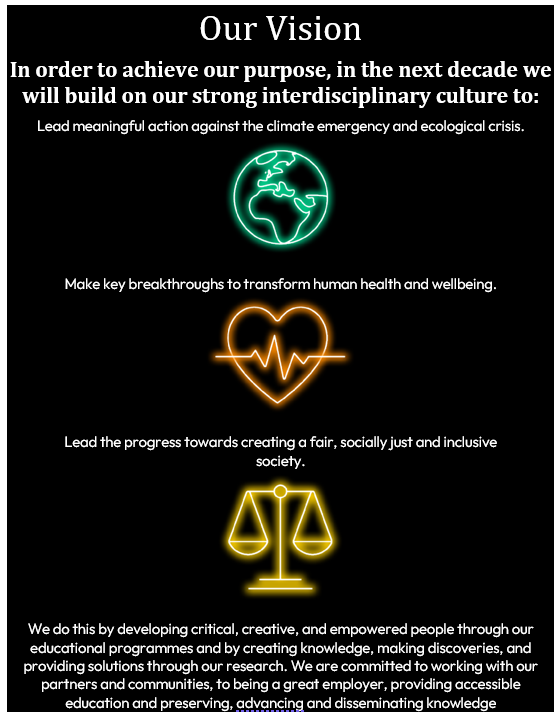
Our Marchmont Observatory11 provides regional economic intelligence. Our Environmental Sustainability Institute12, Global Systems Institute13 and Centre for Energy and the Environment14 provide evidence and projects for business, strategic partners and local authorities, on sustainability and net zero, climate emergency and environmental strategies linked to local growth. South West Partnership for Environment and Economic Prosperity (SWEEP)15 generated benefits for businesses, policymakers, and communities on natural capital.
University oversight of local growth comes from our Business Engagement and Innovation Committee (chaired by the new DVC Business Engagement and Innovation) superceding the former Regional Strategy Group (2015 – 2022) and delivered by the Divisional Director of Innovation, Impact and Business. The Business Engagement Strategy 2017-2022, has regional innovation and talent are key pillars16.
Large scale University-led projects and initiatives seek to accelerate the growth of key regional sectors including marine technology, environmental intelligence, floating offshore wind, critical minerals, aerospace, space, and health.
A Regional Skills Strategy prioritises where the University can work with partners to boost skills and talent retention.
New Civic University Agreements (CUAs) have been launched for Exeter and are being finalised for Cornwall and the Isles of Scilly, for Devon and for Somerset. These strengthen our strategic relationships and put in place actions plans to deliver sustainable growth.
We work to accelerate the growth of a thriving knowledge economy in our region and as partner in the Exeter Science Park, offer incubation, business acceleration and scale up services to businesses in the wider region via SETsquared Exeter17. SETsquared is a leading global business incubator Figure 3.
Figure 2. Regional Skills Strategy
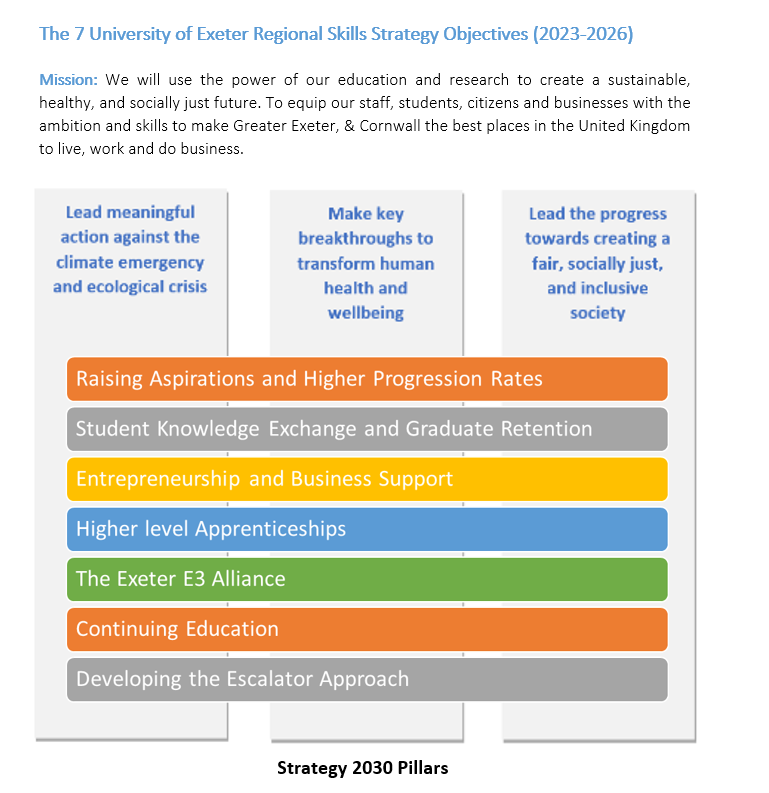
Figure 3. SETsquared Infographic
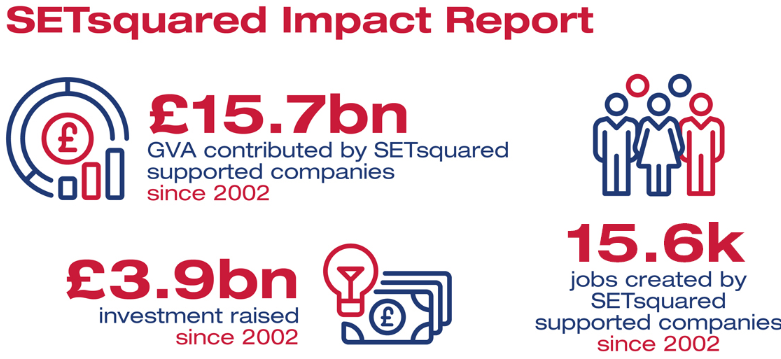
Aspect 2: Activity
To deliver our strategic goals and regional impact we have developed an extensive programme of activity, initiatives and projects in the R&D, innovation, skills, culture, and civic arenas.
Research, Development, and Innovation supporting Key Sectors and Regional SMEs
A network of sectoral Research, Development, and Innovation Hubs (RD&I Hubs) enables researchers and industry to co-create business solutions. Through these sector-based Hubs we co-ordinate networks of businesses, supported by industrial research fellows, key academics, and challenge funding. Led by the University and delivered in partnership with other regional R&D organisations they support businesses to innovate and grow. During the ESIF programme period, the University has led/ partnered) in 38 projects with a value of £45.5M across all partners, including £4.9M of UoE match funding, delivering support for local growth in Devon and Cornwall. The total portfolio of ESIF projects in which the University is a partner is valued at £167M.
Figure 4. Exeter’s RD&I Hub Model (example of Marine i)
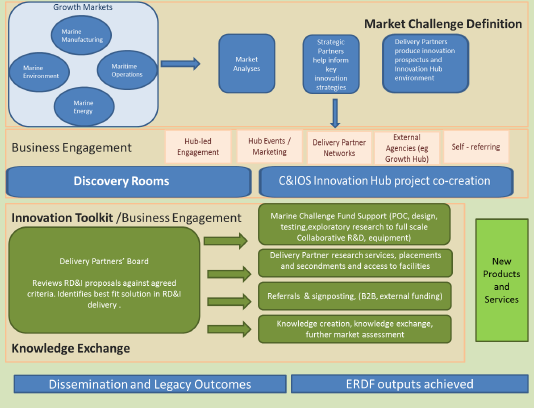
Our ESIF programme and leadership of Marine- I, TEVI, Smartline, The Inclusivity Project, Deep Digital Cornwall, and the Impact Lab has been enabled by collaboration with 62 strategic partners including the Met Office, Plymouth Marine Laboratory, the Universities of Plymouth and Falmouth and many others.
We have developed transformational proposals to strengthen the region’s assets – the Environmental Intelligence Accelerator, part of the Marine and Environmental Intelligence Accelerator, is one such proposal. A successful £32M UK RPIF project with South West Water includes the construction of a Centre for Resilience in Environment Water and Waste (CREWW). The Centre for Future Clean Mobility, supported by LEP investment specialises in developing new hybrid and electric powertrain technology for cleaner mobility, supporting companies in region.
This is further supported by cluster activities including a new SW Defence and Security Cluster, (established by the University) and MARI UK SW.
Our Sector Plans for 2021-2022 outline the university’s innovation and business development priorities, including their regional objectives and partners. We aim to deliver innovative solutions aligned to national priorities, regional development, and economic growth. Plans are updated annually to reflect the changing context of innovation.
We support regional business networks, are on the board of the SW CBI Regional Council, support the South West Business Council and a range of Chamber of commerce in the region.
Corporate Partnerships
We have a number of transformational strategic partnerships in place with companies based or with interests in the region, and their supply chains, and aligned to the priorities of the University’s 2030 Strategy including: Babcock International, South West Water, the Met Office, Plymouth Marine Laboratory; Royal Devon University Hospital Trust National Trust, South West Water, Met Office, DSTL, and the National Trust.
Enterprise Support
As part of the SETsquared partnership, we provide support for business start-up, acceleration and scale up, to regional businesses. We create entrepreneurship skills, start ups and spin outs through our student start up incubator, our Entrepreneurial Researcher Programme , and participation in ICURe and the ASPECT ARC accelerator. Operating out of Exeter Science Park Centre (we have invested £3M into a unique partnership with Exeter Science Park18), we provide the innovation services for the Science Park and the wider regional hinterland.
In October 2019, SETsquared Exeter secured £800,000 funding from Research England to form the University of Exeter Enterprise Zone (UEEZ). This enabled the development of a Business Acceleration facility – The Hive - and a Technology Exploration Lab, to home the SETsquared Exeter Business Accelerator programme. A further £1.1M from ERDF has extended the scale and reach of the programme and since April-2021 has enabled greater Business Accelerator outreach to across Devon, supporting sub regional Innovation centres in Barnstaple, Torbay and at our Penryn Campus in Cornwall. Our “Discovery Room” events bringing together more that ~400 attendees from SMEs, large companies, and academics to highlight activities in areas including: Digital Healthcare and Immersive Technology.
In Cornwall our partnership in the Future Focus programme enabled us to provide support with events, access to expertise, coaching and grants on topics such as: Circular Textiles and Fashion, Cornwall Tourism; sustainability and mining. Our ARCA project supports small businesses to transition to the circular economy.
Our Exeter Entrepreneur guide provides a unique resource to help students and staff engage with entrepreneurship, with the aim of retaining our spin outs and staff and student start-ups in the region.
Supported by Santander, our student start-up programme19 engages over 950 participants annually, our Centre for Entrepreneurship enables any Exeter student to develop a “proficiency in entrepreneurship” degree. Our student incubator supports students with developing their start up proposition and a new facility, “The Deck”, encourages student start-ups to remain in the SW.
University of Exeter Business School is delivering the Help-to-Grow Management Programme - a practical management training course for senior managers of small and medium-sized businesses, accredited by the Small Business Charter20.
We have also become the leading University in the SW region for KTP programmes.
Skills and Talent Retention
Our Regional Skills Strategy ensures a focus on widening participation, strategic skills for the region, entrepreneurship skills, and our Russell Group leading degree apprenticeships and CPD offers support to regional business. We have further expanded our innovative Skills Escalator approach (Figure 5), as part of the creation of the

South West Institute of Technology21 in which we are a partner. We opened the new SWIOT building on the main campus in 2021. Established in 2019, SWIoT is an ongoing £25M initiative with the Universities of Exeter and Plymouth and FE colleges in HotSW and Cornwall, delivering digital and advanced manufacturing training to meet employer needs. Exeter’s Degree Apprenticeship team is delivering 2400 apprenticeships (half of which are in the region) and working with over 200 employers, 58 in the region (21/22).
Civic Development
In 2021 The University of Exeter signed its first Civic University Agreement22 in Exeter with Exeter College, Exeter City Council and Devon Partnership NHS Trust to support city economic growth. MoUs are underway with the South West Federation of Museums, Cornwall Museum Partnership, Exeter Cathedral, Powderham Castle and the RAMM. Outputs include employability initiatives, joint bids and shared programmes of work and advocacy. We now provide the secretariat for the EUniverCities23 network – which leads on best practice in University/Civic relationships working across Europe.
Each year the University invests over £5M HEIF funding in delivering its, knowledge exchange activity of which regional innovation and talent is a significant activity.
We partner with the universities of Bristol, Bath, and Cardiff through the GW4 Alliance focusing on a collective approach to large-scale research initiatives and doctoral training. Established in 2015, GW4 has invested over £4.6M in research, training, and world class facilities.
Aspect 3: Results
An Economic Impact report24 (Oxford Economics, 2022), provides a breakdown of the economic impact generated by the university in the academic year 2020/21 across the region.
Figure 6. Economic Impact of the University of Exeter

By March 2022, our ESIF projects had worked collaboratively with 62 partner organisations in the region delivering many significant outcomes.
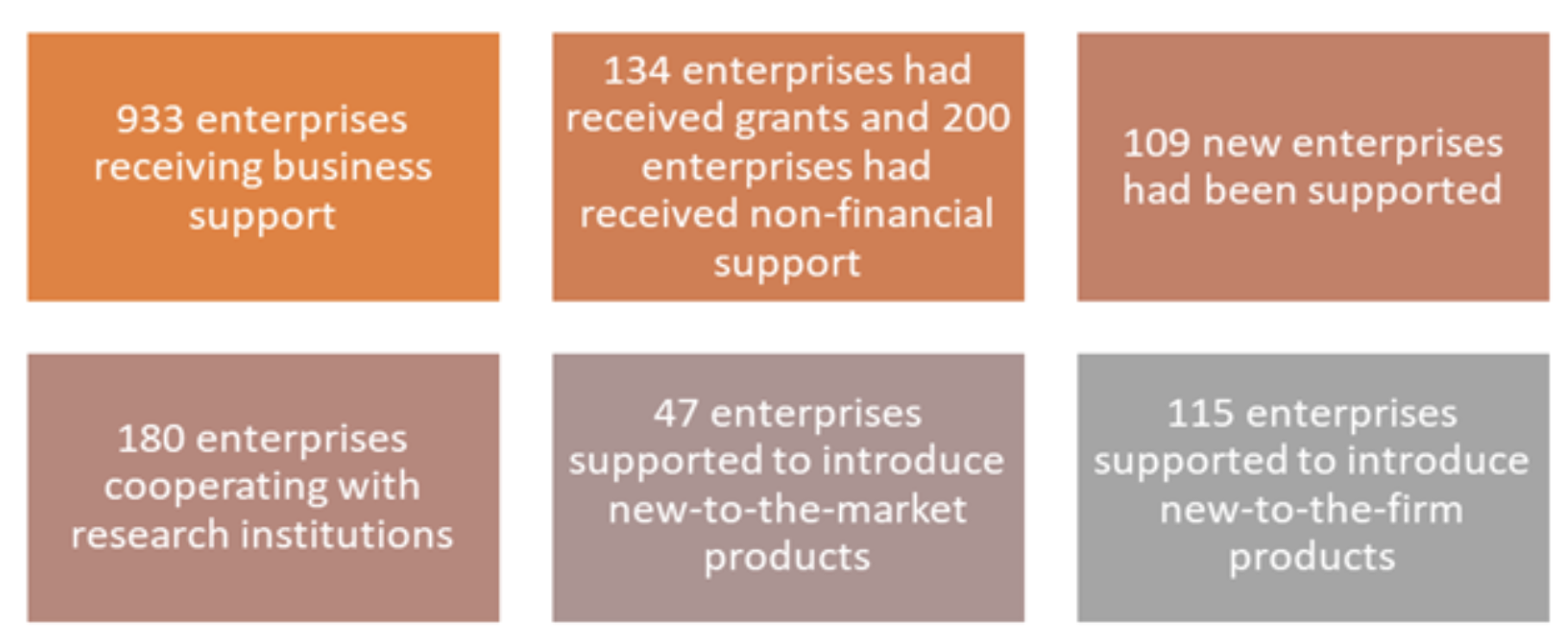
Figure 7. ESIF Programme Regional Outcomes (July 2022)
We regularly review practice to draw lessons from projects through our Lessons Learned Group and review performance through our Risk and Compliance Group, Regional Strategy Group (2018-22) and now our Business Engagement and Innovation Committee. This has enabled us to review the impact of our RD&I Hubs in supporting regional innovation.
We have several strategic outcome measures25. Business Expenditure on R&D (BERD) at the University of Exeter is up 41% year on year compared26 with national growth of 7%27. The University attracts business R&D funding into the region at a faster rate than nationally.
The SETsquared Exeter team, has contributed to outcomes related to business support including:
The OfS £2m Intrapreneurial Knowledge Exchange Enterprise Pathway (IKEEP) project ran from Oct 2020 – Dec 2022, introducing entrepreneurial competencies to undergraduate, masters and PhD students plus placement projects with local companies. It saw more than 1,100 Exeter students trained with 200 undertaking placement projects. More than 40 companies from the GSW engaged with the project.
8 Entrepreneurs Workout programmes were delivered to 60 business and individuals.
The UEEZ project accelerator launched 10 cohorts, totalling 95 businesses.
In 2021 and 2022 our UEEZ Business Accelerator members raised ~£8.4M of private investment alongside ~£1M of grant funding. The current capital demand from members is currently £16.5M.
The Accelerator is on target to engage with 130 new regional ventures or potential entrepreneurs, supporting the creation of 30 new jobs and help to launch 19 new to market products.
The University’s participation in the SETsquared Partnership’s28 Scale Up project, resulted in £14m in project activity, £11m in grants and contributed over £2.7m to the university since 2019.
Graduates from the SET squared Exeter Student Start-up and Business Accelerator programme have gone on to secure multi-million pounds of investment and turnover29.
The University is the leading Russell Group provider of Degree Apprenticeships30 with 2400 apprentices in 21/22, 52% of those learners being based in the region, employers include the NHS. The South West Institute of Technology31 (of which the University is a partner) has exceeded recruitment targets for data analytics students.
The University has contributed to the growth of the region and the City of Exeter, which is currently the 2nd fastest growing city in the UK by population32 and has the lowest proportion with no qualifications. The % of people in Exeter with level 4 and above is 30% more than the UK and Devon average and ranks in the top third of all UK cities. The latest ONS figures illustrate33:
Employment in knowledge intensive sectors is now 20% higher in Exeter than the UK average
14th out of the 63 largest towns and cities for the number of patent applications per 100,000 people (16.59), up from 32nd in 2019.
Productivity is 20 points ahead of the average for Devon and Cornwall
GVA growth is 150% higher than the HotSW LEP, (excluding Exeter).
2nd highest net in-commuting of any town or city in England or Wales.
To assess the impact and the benefits of our continued engagement with regional businesses we undertake an annual survey. In the most recent survey 98% thought the University’s role in supporting innovation and business, as well as social and economic growth was important; 25% rating the University as ‘extremely’ important.
Public & Community Engagement
Summary of approach
Public and Community Engagement (P&CE) are central to research, impact and education at the University of Exeter, at the heart of our new Strategy 2030, and our suite of Civic University Agreements (CUAs). We have continued to build P&CE support capacity within our new Faculties, supporting researchers to conduct high quality, meaningful Public Engagement with Research (PER), while our Public Engagement Strategic Advisory Group (PEG) provides strategic oversight and leadership for PER across the University. We have sustained particular P&CE excellence in health, with strengths also in social sciences and humanities. We continue to seek increased diversity both across the disciplines, and the communities with which we engage, and to improve coordination and leadership at the institutional level.
Aspect 1: Strategy
Public and Community Engagement (P&CE) is a guiding principle of our research culture at the University of Exeter and is central to the way we delivery education and impact. Our new Strategy 2030 was launched in October 2021, following a consultation with more than 4,000 colleagues, students, community members and alumni. It sets out a vision for how we will use our education and research to create a sustainable, healthy and socially just future. People, place and partnerships are at the heart of this Strategy, and our Vision includes commitments to work with our partners and communities and help our researchers and educators co-create and exchange knowledge and innovation (Figure 1).
The University of Exeter is committed to engaging diverse publics as a core characteristic of its role as a civic university and anchor institution and has a clearly stated vision. Our researchers actively seek new ways to engage with diverse public communities in order to nurture, support and develop meaningful partnerships to tackle some of the fundamental issues facing humankind. Engaging with a wide range of publics is necessary to support the quality of our research and ensure that our research can make a difference locally, nationally and globally.
Strategy 2030 also prioritised the development of Civic University Agreements (CUAs) across the Southwest. Our CUAs seek to strengthen relationships between the University, regional stakeholders and communities ensuring that they are more strategic, meaningful and effective, enabling us to co-create solutions for society’s most pressing challenges. Our Exeter CUA was co-created with our community and launched in October 2021, while CUAs with partners in Devon & Torbay, Cornwall and the Isles of Scilly are in development. The CUAs are based on evidence of local needs and built on extensive consultation. The Exeter CUA Needs Analysis and Consultation Synthesis summarises the consultation that helped shape the priorities for the mission-led approach. An Exeter Community Panel supports the delivery of the CUA and helps co-create local Missions. Our first Civic Survey of Cornwall was completed in 2022. Sampling 1350 residents, this provides a baseline to assess future community impact of the CUA.
Our Public Engagement Strategic Advisory Group (PEG) provides strategic oversight and leadership for Public Engagement with Research (PER) across the university. Comprising academic and professional services (PS) colleagues from across our four campuses, and external partners, PEG aims to: drive the quality and purpose of PER; provide strategic and thought-leadership in PER; and demonstrate the value of PER to all staff. We are currently refreshing the PER Positional Paper and Delivery Plan to align with Strategy 2030, the new Faculty structures and CUAs.
PEG reports progress and makes recommendations to the Research and Impact Executive Committee (RIEC) and the University Executive Board via the DVC for Research and Impact. Other senior academic and PS managers with responsibility for P&CE are shown in Figure 3.
P&CE is embedded within many of our research centres which have their own engagement strategies. The PenARC Public Engagement Strategy (Figure 2) and Wellcome Centre for Cultures and Environments of Health (WCCEH)’s Engagement Implementation Strategy were co-produced by public collaborators and researchers, demonstrating a commitment to EDI, ensuring diverse community perspectives are represented in our research and that no individuals, groups or sectors of society are excluded from engagement with research.
Figure 1. Our stakeholders
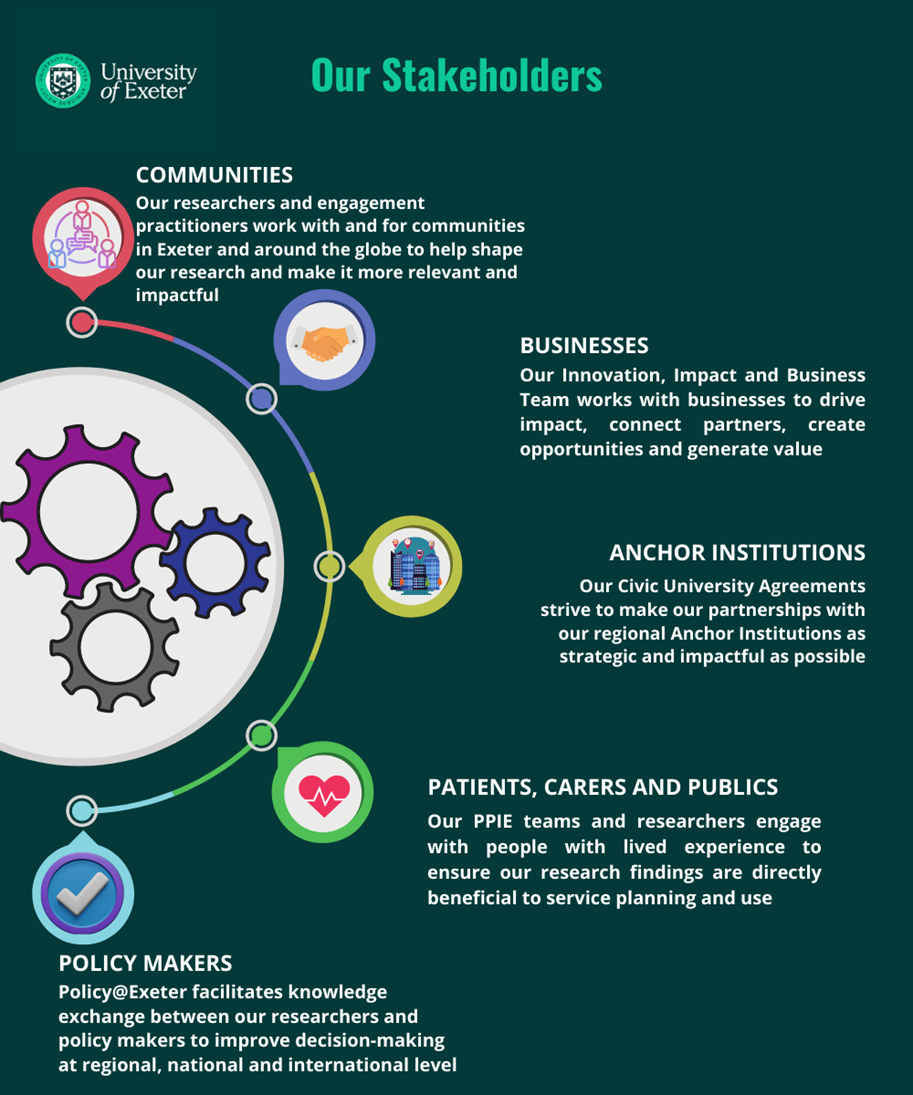
Figure 2. Patient and Public Involvement Strategy, PenARC
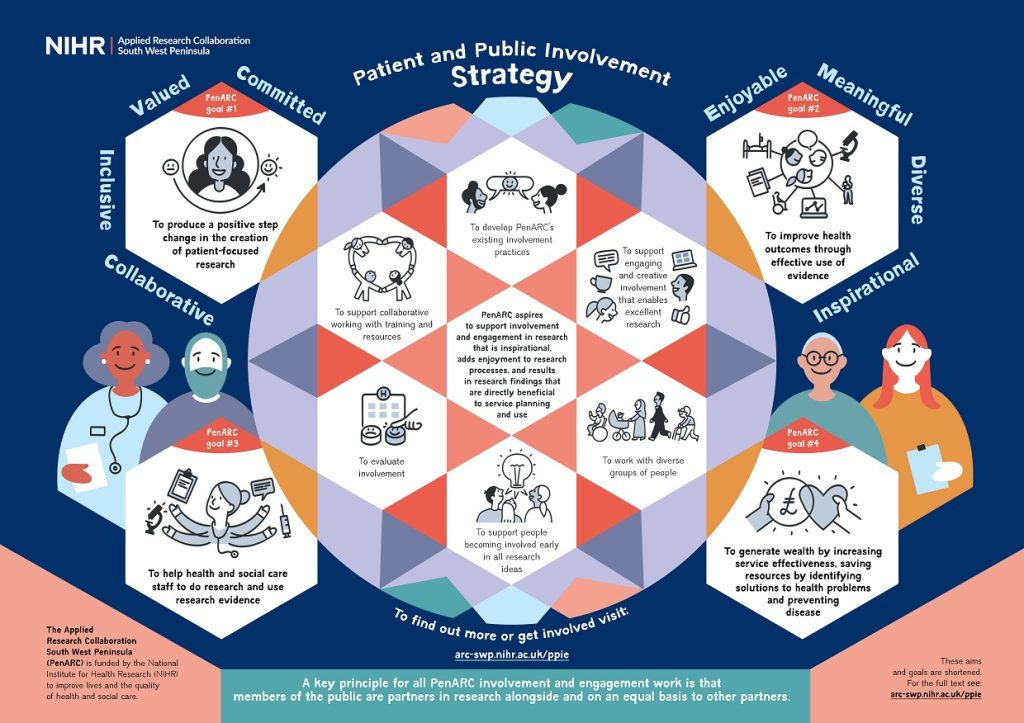
Aspect 2: Support
We have strong P&CE support at institution, Faculty, Centre and Institute level with PE Professionals supporting researchers to conduct high quality, meaningful PER (Figure 3). Professional services provide overarching strategic and operational leadership for all aspects of PER across the University.
Our Engaged Research Manager (ERM) manages PEG, oversees the implementation of the PER Delivery Plan and training programme, and runs an Engaged Research fund. PE guidance and resources are accessible via the intranet’s Research Toolkit and training is offered to researchers and postgraduate students via the Impact and Engaged Research Network (IERN) and the Doctoral College.
Support for our Civic University Agreement activity, has been delivered through our regional engagement team. A range of activity has supported community engagement in the development and delivery of the CUA, including the development of a Community Panel in Exeter (chaired by the Registrar). This guides our local engagement and ensures community voices are reflected in our plans.
Our Community Partnership Hub connects public, voluntary, community and social enterprise (VCSE) sector organisations with researchers and students at the University of Exeter. Our aim is to help establish long-term, sustainable relationships which support partnering through research projects, student placements and internships, or volunteering. The Hub provides a portal for publics to access the University and supports long-term mutually beneficial relationships.
Our NIHR Patient and Public Involvement & Engagement (PPIE) Team supports researchers and students to involve patients, service users, carers and family members in their research and conduct studies on how to involve publics in health policy, research and practice. WCCEH boasts two Engaged Research Facilitators and provides Transformative Research Awards supporting activities which complement the Centre’s research themes. Similarly, the Wellcome Trust funded Translational Research Exchange @ Exeter (TREE) also has embedded engagement support. PE is integral to all TREE biomedical and clinical research and ensures translational impact and societal benefit. During the reporting period TREE Seedcorn, pump-priming and PER awards supported 27 PE activities linked to the Wellcome Trust remit with a budget of £88k.
Meanwhile, our Arts and Culture Team is a conduit for improved engagement and collaboration with our communities, creating space for creative, mutually beneficial collaborations between staff, students and creative practitioners.
Our P&CE activities are guided by the needs and interests of our publics and we continue to create new mechanisms to be more responsive to societal need. Numerous groups with lived experiences including PenPEG, PenCRU, HEPE, LEG and MAGPIEs, support research across the Faculty of Health and Life Sciences, volunteering time and expertise to ensure our research is relevant. At a regional level, we undertook extensive engagement and consultation with our communities and voluntary sector, to understand how we can better support our region through strategic collaboration.
Figure 3. Support for Public and Community Engagement
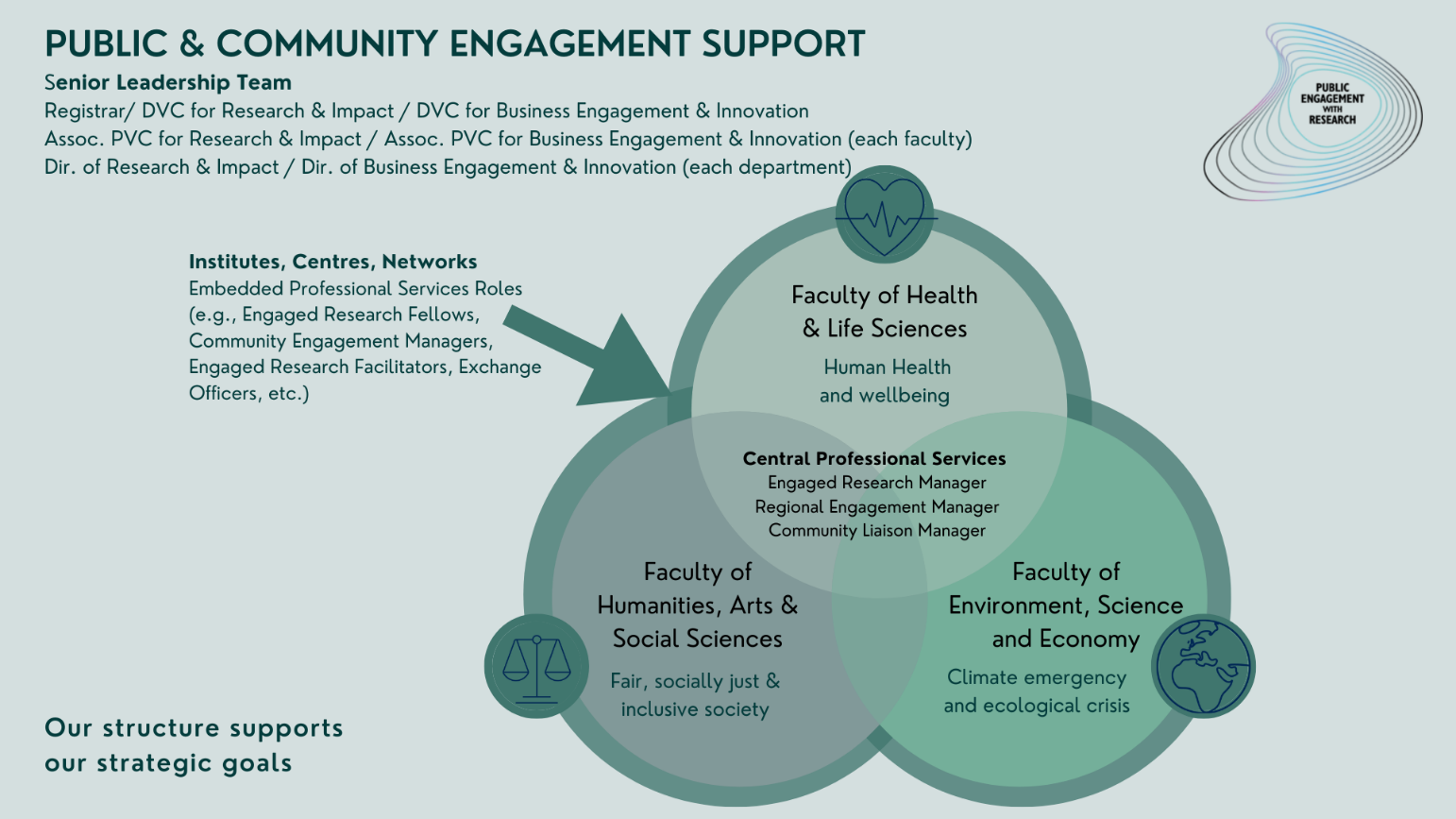
Reward and recognition for PER has been embedded into promotions criteria and we are seeking to build it into workload planning and recruitment. Excellence in engagement is celebrated with our Knowledge Exchange Awards.
Over this period, the dedicated central PER support budget was around £125k of a total Research and Impact Strategy budget of £2.6M. The total resource dedicated to P&CE is higher within our matrix environment. The majority of our P&CE and central support roles are funded from large programme projects from MRC, Wellcome, EPSRC and the NIHR. Our Civic University Agreement activity has been supported by HEIF and Policy Support Fund to the tune of £100k.
Aspect 3: Activity
P&CE at UoE is increasingly embedded in research across all disciplines, featuring in around 730 awards across our portfolio. Institution-wide mapping shows sustained excellence in health, with strengths in social sciences and humanities and increasing engagement in climate change and environmental sciences.
In September 2022, UoE was restructured into three academic Faculties and eight PS divisions to support the delivery of Strategy 2030. Six interdisciplinary institutes and 14 research networks, such as the Biodiversity and People Network has PCE embedded in their work, each dedicated to tackling significant world challenges, with a commitment to P&CE and EDI (Figure 4). Our Arts and Culture Strategy encourages new ways of working and creative collaborations on themes aligned to Strategy 2030. For example, the One Chance Left collection of poems connecting voices from climate science and healthcare. Strategy 2030 provides a strong rationale for these activities.
The Global Systems Institute (GSI) is built around an interconnected approach to research, education and impact with engagement at its centre, and co-production amongst its core values. GSI research is solutions-focused, with a commitment to working collaboratively. Projects range from plastic reuse networks in the Southwest to regenerative ecology projects in Kenya. In 2022, GSI explored how to bring together citizens, policymakers, business, and communities to tackle global challenges, delivering a creative toolkit to foster co-production.
Excellence in our health sciences P&CE is exemplified in the WCCEH which is committed to engaged research that enables health and wellbeing. The centre brings researchers, public partners, and organisations together to address challenges such as the health impacts of loneliness and social isolation. Similarly, researchers at the European Centre for Environment and Human Health (ECEHH), work with a range of partners to ensure their research into the complex connections between environment and health is informed by local issues and real-world challenges (Mission, Vision and Purpose).
Examples of our cross-faculty P&CE include:
The People and Mining Network - an inclusive and accessible space for academics, practitioners, policymakers, and students to engage with research and debate in an international forum, to help meet the challenges presented by mining.
Researchers from our Centre for Water Systems1 facilitate KE between engineers, social scientists and publics on a range of projects including Fiware4Water, NEXTGEN, ARSINOE and Blue Heart Project.
Based in Physics & Astronomy, Raman Nanotheranostics (RaNT) is a £5.7m Research Programme developing a non-invasive technique to detect and treat cancers. The RaNT Communities Engagement Manager engages with people living with cancer, clinicians, and healthcare professionals, incorporating their lived experience into the design and implementation of this technique.
The Wellcome-funded Transformations project explored the history of gender and science with young trans and gender diverse people and co-produced a drama podcast Adventures in Time and Gender, featuring trans and non-binary performers, musicians and sound designers.
FUTURES is a festival of world-class research. Delivered in collaboration with Universities of Bath, Bristol, and Plymouth, FUTURES has brought science, culture and research to life for audiences across the Southwest for the last 3 years.
We are also growing our KE activity between students and publics. An increasing number of modules support students to apply their learning to real-world contexts e.g., BSc Business (Cornwall), BA Drama, MA Food Studies, MSc Global Sustainability Solutions. Our Community Law Clinic works in partnership with community groups and advice services across the Southwest, and our Grand Challenges and Future 17 programmes supports students to design innovative solutions to real world challenges.
1Co-producing research with academics and industry to create a more resilient UK water sector
Figure 4. University of Exeter Structure
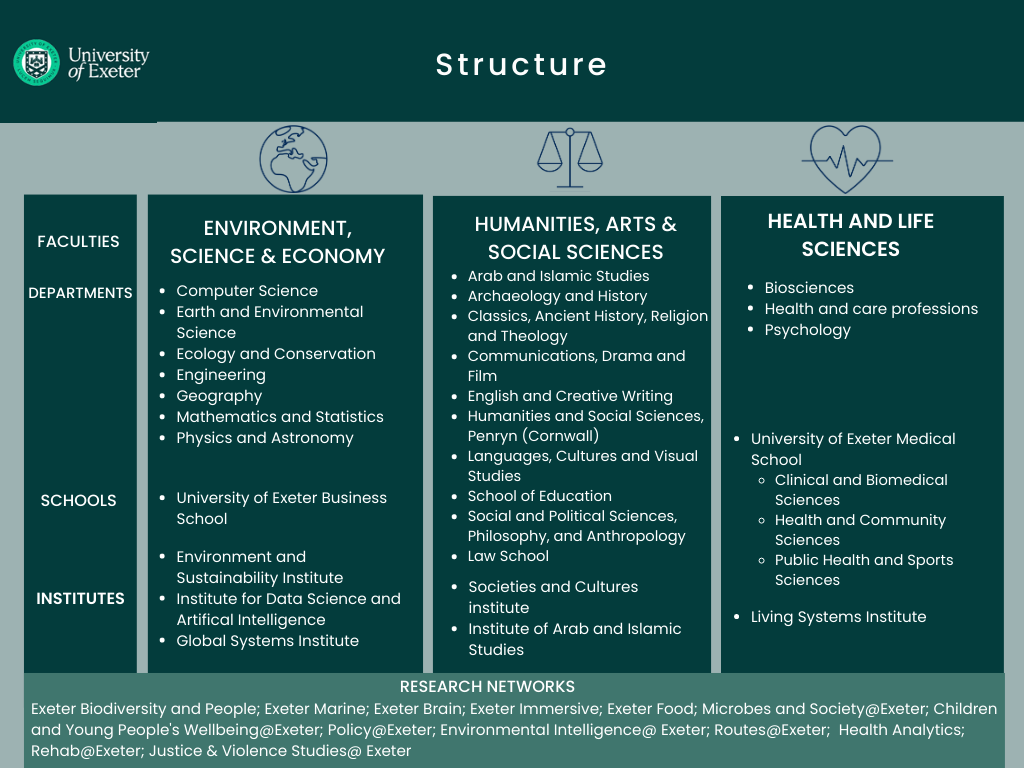
Aspect 4: Enhancing practice
The evaluation of all forms of P&CE is encouraged and supported at UoE, with evaluation embedded in all engagement activities. We have a wealth of relevant expertise across the institution, including researchers who specialise in the evaluation of public involvement in health, and our network of PE Professionals who support and advise researchers on evaluating and improving their PE activities. Resources and guidance on evaluating and evidencing impacts from PE activities are available on the Research Toolkit and evaluation training is offered to P&CE awards recipients.
All externally funded P&CE awards take an appropriate and proportionate approach to evaluation against progress and impact, with findings used to inform other P&CE activities. Our Engaged Research Awards are granted to early career researchers to collaborate with non-academic, non-commercial partners and are evaluated for achievement against aims to (1) support development of these collaborations; (2) support testing of new collaborative methods; and (3) support pre-proposal activity leading to a collaborative grant application. Evaluation helps us identify how P&CE helps to shape research and leads to impact; where the P&CE “gaps” are that could benefit from additional support; and how we can continue to improve the Awards scheme.
Individual Centres continuously evaluate the effectiveness of their P&CE activities and awards. For example, the PenARC PE Strategy describes how the PPIE team research and evaluate involvement, and share findings with all public collaborators, so they can improve practices and capture impact.
Analysis showed that in REF2021, 64 of our draft 130 Impact Case Studies included PER, demonstrating the breadth of our engagement, and importance of these activities in delivering impact. Continuous analysis and sharing of case studies helps us understand how P&CE is influencing policy at all levels and identify gaps where resources should be targeted to help us reach our strategic goals.
Our Exeter CUA Delivery Plan sets out a series of KPIs against a set of ambitions within each of the five CUA Missions. This framework helps us monitor our P&CE activities and ensures our local partnerships are strategic and meaningful. The CUA delivery team within IIB is accountable to the CUA board members who meet twice a year.
Mapping all P&CE activities across the university to support the development of an institution-wide approach to monitoring and evaluation is a priority for the ERM in 2023.
Aspect 5: Building on success
The last three years has been a period of considerable change for UoE, with a new VC, a new Strategy and organisational structure, and CUA development. During this period, the focus has been on developing a PS structure that will respond to the future priorities of the new strategy.
The Engaged Research manager provides strategic and operational leadership for PER across the University and is responsible for monitoring, evaluating and reporting on progress to RIEC.
External accountability is key to our strategic goals. External PEG members monitor the implementation of the PER delivery plan and help us improve the way we engage with diverse publics throughout all stages of research.
Our Civic University Agreement Community Panel, chaired by the University’s Registrar, helps us identify local challenges and opportunities and deliver the Exeter CUA ambitions. Regular meetings of the panel enable us to review progress against agreed missions under the oversight of a CUA Board.
We use the NCCPE’s EDGE Tool to benchmark progress. The results help inform the update and priorities of the PEG Delivery Plan.
Meanwhile, audits of P&CE activity across the institution and evaluation of the process and outcomes of our Engaged Research Awards have helped identify progress to meet our strategic aims. We have continued to build P&CE support capacity within our faculties, through embedding P&CE support into large programme grants such as EPRC funded RaNT.
While we have cross-disciplinary coverage and clear areas of excellence in P&CE, we continue to seek to increase diversity both across the disciplines, and in the communities with which we engage. Of the 64 P&CE REF2021 Impact Case Studies, three projects engage working-class communities, two LGBT+ communities, two BAME communities, two religious minority communities, and one families with children with disabilities. We have commenced a comprehensive review of our training provision and needs, with a view to developing more context-specific support and offering training in EDI in PER as a priority. To foster real change, PEG’s priorities include ensuring diverse representation on advisory groups which provide leadership for investments in P&CE; and creating mechanisms to enable engagement with underrepresented groups.
PEG reports progress and makes recommendations to RIEC and to University Executive Board via the DVC for Research and Impact. We use multiple routes to disseminate results and enhance the visibility of our P&CE activities. Internally, this includes our Impact and Engaged Research Network, internal bulletins, intranet and events (e.g. The Exchange Symposium). Beyond interaction at individual project level, we engage externally through an active programme of public events such as Futures, external webpages and social media.
Self-assessment Score: Building on Success3.5Note You are currently viewing the latest version of this narrative statement. View the previous version as published in previous iterations of the KEF (KEF1 and KEF2)